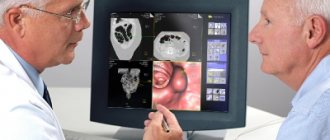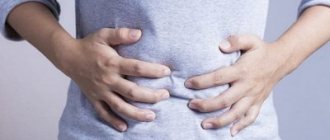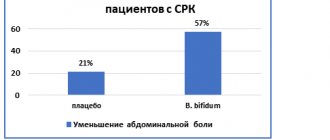Are you suffering from abdominal pain, cramps and constant bowel movements? Unpleasant sensations in the intestinal area can ruin all plans, so we use various medications to relieve abdominal discomfort. But these measures only allow you to temporarily get rid of the symptoms of a serious disease, which return again and again. What if these symptoms have a single cause - irritable bowel syndrome? What this disease is, what its symptoms are and how to cure it, we will tell you in this article.
What is irritable bowel syndrome?
This is a disorder of the intestines and discomfort in the abdomen during bowel movements. The syndrome itself is not a disease, but rather a set of symptoms that often occur for an unknown reason. Unfortunately, such a disorder can significantly reduce a person’s quality of life, forcing him to remain in an uncomfortable state: digestion is disrupted, metabolic processes in the body worsen, and the saturation of the human body with nutrients decreases.
Irritable bowel syndrome is a very common occurrence among people aged 25 to 40 years. Statistics show that at least once in their life, every third person has experienced the unpleasant symptoms of irritable bowel syndrome.
Self-medication in this case can be very dangerous to health. The fact is that the syndrome is treated comprehensively and under the close attention of the attending physician. The consequence of self-medication can be intestinal obstruction and numerous chronic gastrointestinal diseases. With the first signs of irritable bowel syndrome, you should contact a therapist, who will refer you to a more specialized specialist - a gastroenterologist. The diagnosis is usually made only after excluding tumors and inflammatory changes in the intestines.
The intestines are where food is digested and nutrients are obtained by the body. When food enters the intestines, it moves along the intestines. This process of advancement is achieved through the work of smooth muscle cells within the intestinal walls. The cells alternately contract and relax. But when IBS (irritable bowel syndrome) appears, cell function is disrupted. Food begins to pass through the intestines either too quickly or too slowly. The result is discomfort and constipation or diarrhea.
Symptoms of irritable bowel syndrome
- nausea and gag reflex;
- flatulence with copious release of gases;
- abdominal pain or cramps;
- constant bloating;
- stool disorders - constipation or diarrhea;
- pain in the lower abdomen;
- sleep disturbance;
- increased heart rate;
- increased fatigue;
- long digestion of food;
- the appearance of mucus in the stool;
- false urge to defecate;
- loss of appetite.
Also, the disease is often accompanied by symptoms that, at first glance, are not characteristic of intestinal pathologies: headaches, discomfort in the spine and muscles, weight loss and abdominal swelling. All these symptoms are not constant, they can disappear and reappear over time. Unpleasant sensations most often appear after each meal, and then become less pronounced.
Lower abdominal pain in pregnant women
If a pregnant woman has pain in the lower abdomen in the first trimester, this may indicate a physiological process associated with stretching of the muscles of the peritoneum and pelvis as a result of intensive growth of the uterus. But this symptom may also be a sign of ectopic pregnancy, which is dangerous due to rupture of the fallopian tube and the development of peritonitis. During an ectopic pregnancy, pain in the lower abdomen will be accompanied by weakness, dizziness, and nagging pain in the rectum.
If in the early stages of pregnancy a woman begins to experience pain in the lower abdomen against the background of minor bleeding from the vagina, she should urgently seek medical help. There is a high probability of a miscarriage, which can be prevented with timely consultation with a doctor.
Pain in the lower abdomen in the 2nd and 3rd trimesters, accompanied by heavy bleeding, may be a sign of placental abruption. This outcome is dangerous for the fetus and usually appears after a pregnant woman falls or gets hit in the stomach.
In the last weeks of pregnancy, when pain appears in the lower abdomen, we can talk about the beginning of the labor process. But in some cases, the syndrome appears due to exacerbation of gynecological pathologies.
Reasons for the development of the pathological phenomenon
- Nutrition. Eating fried, salty, sweet and fatty foods, as well as alcohol-containing drinks, has a negative effect on digestion. In addition, modern people constantly snack on the run. Which also negatively affects intestinal function.
- Hormonal disbalance. More often, this reason is typical for women during periods of life such as pregnancy, breastfeeding, menopause, and the menstrual cycle. As for the menstrual cycle, during this period the amount of chemicals changes, and the problem begins to manifest itself more clearly.
- Impaired intestinal motility. If motor skills work in an accelerated mode, this leads to stomach upset and diarrhea. On the contrary, slow bowel movements can cause constipation. As a result, pain leads to a sharp contraction of muscles.
- Emotional stress: stress, depression, anxiety, fatigue.
- Past diseases of the gastrointestinal tract. Infections that cause gastrointestinal diseases can subsequently affect the functioning of the entire intestine.
Diagnosis of irritable bowel syndrome
If you have all the symptoms of the disease listed above, consult a physician. He will conduct an initial examination and refer you to a gastroenterologist. The purpose of primary diagnosis is to exclude the presence of other life-threatening diseases: tumors, inflammatory processes, growths, infectious diseases.
When visiting a doctor, you need to provide a complete medical history, report the presence and frequency of symptoms, and talk about the presence of chronic diseases. After examination and palpation (feeling), the specialist will refer you for laboratory tests, including:
- General blood analysis. The analysis allows you to determine whether an inflammatory process is present in the body, as well as to determine possible anemia.
- General urine analysis. Determines the presence or absence of blood and parasites in the patient’s body, which allows us to talk about the development of a number of intestinal diseases other than irritable bowel syndrome.
- Blood test for celiac disease. A specific blood test that allows you to identify a disease of the digestive system (celiac disease), in which the intestines cease to properly digest incoming food, which is accompanied by diarrhea.
- Colonoscopy. This is an examination of the colon from the inside using a special device (colonoscope).
- Magnetic resonance imaging of the pelvis and abdomen. This is a non-invasive examination method that allows you to study the structure and condition of the organs and tissue of the pelvis in men and women using magnetic waves.
After all the studies have been carried out and all other intestinal diseases have been excluded, the doctor begins treatment and prescribes complex therapy, based on the patient’s medical history.
Pain in the lower abdomen in men
The appearance of pain in this area in men can have both the general causes described above and those characteristic only of the stronger sex. One of the common diseases in men over 35 years of age that causes pain is prostatitis. The appearance of pain indicates that the inflammatory process has already entered the acute stage and requires treatment. This often happens in men who ignore the first signs of prostatitis.
When the prostate gland becomes inflamed, a tolerable nagging pain is first felt in the lower abdomen. Over time, they become more pronounced, sometimes sharp, extending to the testicles and groin area. Discomfort increases during urination. If prostatitis is not treated in time, a man risks encountering another, no less serious disease - prostate adenoma.
One of its clinical manifestations is also pain in the lower abdomen. In this case, pain is felt constantly and is associated with compression of the urethra. A man can independently recognize prostate adenoma: against the background of chronic pain in the lower abdomen, frequent night and daytime urination appears. Pathology requires immediate medical attention.
Pain in the lower abdomen occurs due to inflammation in the testicles or appendages. The pain is of an increasing nature, radiates to the groin and may be accompanied by an increase in temperature.
In some cases, pain in men appears after suffering infectious diseases of the genital tract, scarlet fever, influenza or mumps. In this case, in addition to pain in the lower abdomen, men complain of difficulty urinating, discomfort in the scrotum area, and scanty discharge of pus from the urethra may appear.
Treatment of irritable bowel syndrome
Therapy for IBS should be carried out comprehensively in several stages. The treatment regimen depends on the individual characteristics of the body, the degree and time of the pathology. Most often, drug therapy is prescribed, which is supplemented by a special diet. In the absence of comprehensive treatment, symptoms will reappear from time to time.
The medications that the doctor prescribes for the treatment of IBS not only eliminate painful symptoms, but also improve the condition of the digestive system, and also prevent relapses and complications. When treating diarrhea syndrome, medications with antimicrobial properties are prescribed. They relieve irritation of intestinal tissues, stop excess flatulence and restore normal intestinal function.
When treating IBS with constipation, the use of natural medicines is indicated that eliminate difficulties with defecation, have a gentle effect on inflamed intestinal tissue and free it from feces. May be in the form of chewable tablets or rectal suppositories.
If the appearance of IBS is associated with neurological disorders, antidepressants are prescribed - they normalize the functioning of the nervous system and improve the psycho-emotional state.
To relieve pain, painkillers and antispasmodics are used - they relax muscle fibers and tissues that are in hypertonicity.
Diet for irritable bowel syndrome
The diet for IBS depends on what symptoms accompany the pathology. If you experience frequent constipation, you should exclude dry, salty foods from your diet. For diarrhea, avoid liquid foods, vegetables, and fruits.
If you suffer from flatulence, you should limit dairy products, nuts, and beans. If there is severe pain in the intestines, fatty, salty, and heavy foods are not allowed.
At the Medunion clinic you can undergo a full examination and treatment of irritable bowel syndrome. We employ practicing doctors with over 10 years of experience. In the diagnostic room you can take all tests and undergo hardware examination in a comfortable environment. For our clients there is a special offer “doctor at home”. If you are unable to visit our medical center yourself, a doctor will come to you and conduct an examination at home.
Take care of your health and make an appointment with a multidisciplinary medical center directly on our website.
Drug therapy
The following drugs are used in the treatment of irritable bowel syndrome:
- peppermint oil – used to reduce the severity of symptoms;
- antispasmodics - hyoscine, drotaverine and other drugs that have proven effective in treating this disease;
- antidepressants – can be prescribed as part of complex treatment to reduce the severity of symptoms. Tricyclics or SSRIs are used. As a rule, treatment involves taking the minimum effective dose. The course of admission is from 4 to 12 weeks. If the symptoms of the disease decrease, the duration of the course can be increased by the attending physician;
- probiotics – included in treatment if symptoms such as bloating and diarrhea are present. Monostrains or combination drugs are used that have a beneficial effect on the intestinal microflora;
- Rifaximin - the course of treatment for irritable bowel syndrome is about 4 weeks. The main condition for treatment with rifaximin is the absence of symptoms such as constipation;
- polyethylene glycol preparations - used in the treatment of constipation. Other symptoms are not affected;
- loperamide - reduces the severity of diarrhea. It has no effect on other symptoms.









